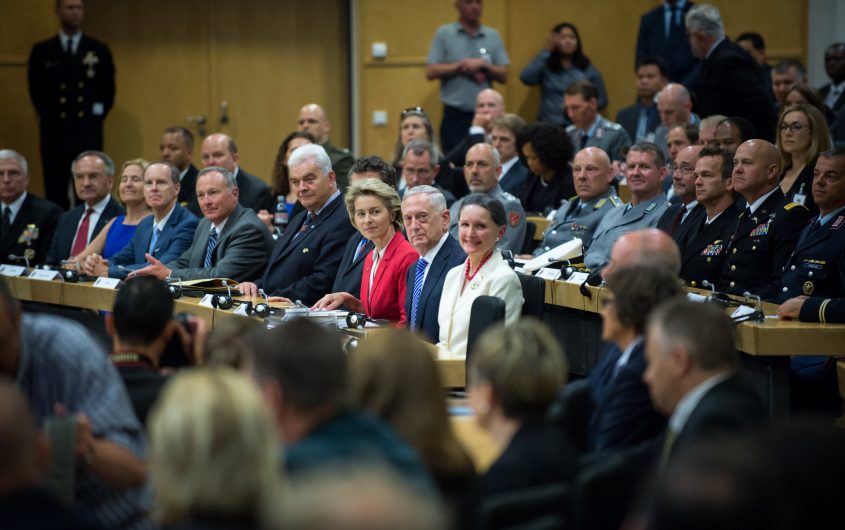
DOD photo by U.S. Air Force Staff Sgt. Jette Carr via Flickr
The Possible Merits of Trump’s Unpredictability

Aylin Matlé
German Council on Foreign Relations
Aylin Matlé is a senior research fellow in the Center for Security and Defense at DGAP. Previously, she has served as the Deputy Head of the Konrad-Adenauer-Stiftung’s Israel office in Jerusalem.
Aylin Matlé holds a PhD from Martin-Luther-Universität Halle-Wittenberg. Her thesis “Drifting Apart of Transatlantic Security: The American Mark on NATO under Barack Obama” examined the impact of the Obama administration on allied and defense policies of European Alliance members. Dr. Matlé worked as a research associate at the chair of international relations and European politics at the Martin-Luther-Universität from 2014-2016. Prior to that, she completed an MA in War Studies at King’s College London in 2014. She holds a bachelor’s degree in Public Management and Governance from Zeppelin Universität, Friedrichshafen.
She was a Fellow in the American-German Situation Room in 2018. In addition, she participated in the AICGS project “A German-American Dialogue of the Next Generation: Global Responsibility, Joint Engagement” from 2018-2019.
On the campaign trail, Donald Trump left no doubt about how he wanted to approach foreign and security policy as U.S. president: “We must as a nation become more unpredictable.” Few would contest that he has delivered on this promise. Recent weeks alone abound with examples underlining his course of unpredictability as he replaced his secretary of state, Rex Tillerson, with CIA director Mike Pompeo; instructed Pompeo to meet with North Korean dictator Kim Jong-un; and ordered an air strike on a Syrian military installation in response to Syrian president Bashar al-Assad’s latest use of chemical weapons against his people. The list goes on. What’s clear is that Trump prefers to play his cards close to his chest even as he is anything but uncommunicative—as we are reminded by his daily (sometimes hourly) barrage of tweets. To some this strategy, if indeed it is a purposefully employed course of action at all, spells nothing but chaos. The United States’ partners, treaty and non-treaty allies alike, are at times puzzled by Trump’s hard-to-predict thinking and it is clearly more difficult for them to prepare for what will be coming out of the White House next. This article explores the implications of the element of unpredictability Trump has imbued American foreign and security policies with and the likely effect on the U.S.’ most important alliance structure, NATO as, at closer inspection, volatility as part of a strategy need not necessarily be a disadvantage.
Since Donald Trump raised the prospect of linking a NATO member states’ defense spending (i.e., meeting the 2 percent of GDP goal) to American readiness to come to an ally’s aid in case of an attack, there has been much talk about the lasting damage being done to the Alliance’s deterrence mission. Why? According to scholars and practitioners alike, the sacrosanct ingredient of deterrence is credibility—credibility that must be relayed to one’s advisory that in case of an assault, the assaulted party will strike back. Creating an air of credibility is only possible by demonstrating the political will as well as the provision of military capabilities to be employed once deterrence has failed. One could rightfully argue that the Trump administration is delivering on the demonstration of military capabilities by means of continuing and even bolstering the European reassurance measures his predecessor set in motion. What’s been called more into doubt on both sides of the Atlantic is the current administration’s political resolve to act on security guarantees embodied by U.S. troops and equipment stationed in Europe and captured most prominently in NATO’s musketeer Article 5 (“One for all, all for one”). Even the slightest doubt about the most potent ally’s political will to act in concert with and on behalf of its allies if need be is said to undermine the credibility of NATO’s deterrence posture.
Creating an air of credibility is only possible by demonstrating the political will as well as the provision of military capabilities to be employed once deterrence has failed.
At the same time, and here comes the big but, it is worth revisiting the concept of unpredictability in deterrence literature in light of a heated debate as is currently on display. Thomas Schelling, one of the preeminent deterrence scholars of the Cold War, developed the idea of “the threat that leaves something to chance.” While the strategic environment in which Schelling devised the concept was an altogether different one in comparison to today, the principle, i.e., the chance of accidents and miscalculations, has not changed and still applies to today’s circumstances. The consequence of “leaving something to chance” is unpredictability, which can well be used as a tool of leverage against an adversary the likes of Putin. In other words: if Russia cannot rule out that the U.S. would come to the aid of an ally when under attack, there is a chance the Kremlin would shy away from such an adventure to begin with—such is the theory at least.
How are these rather abstract expositions connected to real world events though? The answer is very simple: European NATO allies should consider embracing the element of unpredictability Trump has re-introduced into American strategic thinking by ways of including this aspect more prominently into NATO’s official doctrine, thereby bolstering the Alliance’s deterrence posture. The possible renewal of the 2010 Strategic Concept lends itself to such an incorporation as speculations about the updating of NATO’s most important strategic document on the occasion of the Alliance’s 70th birthday in 2019 are running high.
While at first glance relying more on (nuclear) unpredictably may run counter to every fiber of Germany’s security and defense policy, closer inspection will reveal that the concept of deterrence is deeply engrained in Germany’s DNA—both for historical reasons (the country was NATO’s frontline state for nearly four decades) as well as for strategic reasons (idea of deterrence is banked on the hope of being spared actual combat). Consequently, if Berlin were to appreciate—especially in its attitude at NATO Headquarters in Brussels—that the element of unpredictability can help strengthen a strategy it very much favors, a possible avenue to close ranks with the United States could open up. Both from a political and a strategic standpoint, Berlin would be well-advised to at least give this course of action some thought. Undoubtedly, German-American relations could do with a boost.
If Berlin were to appreciate that the element of unpredictability can help strengthen a strategy it very much favors, a possible avenue to close ranks with the United States could open up.
In addition, it is uncontested that NATO’s Enhanced Forward Presence in the three Baltic Republics and Poland merely serve as a tripwire and would not be able to fend off a Russian aggression. Hence, it is all the more important to prevent such an aggression from materializing—appreciating unpredictability and communicating such an acknowledgment in- and outward could be one way forward. Just a few days ago, German defense minister Ursula von der Leyen announced her intention to gear the re-structuring of the armed forces so as to prepare the Bundeswehr more properly for the task of allied territorial defense. This plan suggests that the German defense ministry is grasping the necessity of intensifying its defense efforts in a realm that has been more or less neglected for the past quarter century. Despite Trump’s rebukes of Germany not meeting NATO’s 2 percent target, this development surely would be welcomed in the United States (as well as in other allied capitals) as it at least underlines the German understanding that Washington cannot and will not provide for NATO Europe’s deterrence on its own.








